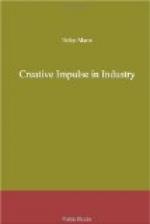The failure of the schools to hold the children gave educators who recognized the artificial character of school curricula, their best reason for introducing matter relating to industrial life. The children’s preference was indeed a valuable indication where reality or real subject matter would be found. The change off from old school subject matter to instruction in methods of industry was a logical experiment. But the movement for industrial education was not inspired by a watchful sympathetic observation of children’s needs; it was in line with the general theory, more or less accepted, that schools should be a reflection of the children’s environment; it was in line with the demand of employers for efficient workers either equipped for specific processes or adaptable to factory methods.
If the promoters of industrial education had been observers of children from twelve to fourteen and sixteen years, they would have found that as they left school they were eager not for skill in technical processes, not for wages, not for greater freedom of association in adult life, not for any of these alone, but for all of these as they were a part of the adventure of the adult world in which they lived. “We have neglected to study the most vital thing in the situation, namely the zests of the young ... we have not taken account of the nature of the great upheaval at the dawn of the teens, which marks the pubescent ferment and which requires distinct change in the matter and method of education. This instinct is far stronger and has more very ostensive outcrops than in any other age and land, and it is less controlled by the authority of school or the home. It is a period of very rapid, if not fulminating psychic expansion. It is the natal hour of new curiosities, when adult life first begins to exert its potent charm. It is an age of exploration, of great susceptibility, plasticity, eagerness, pervaded by the instinct to try and plan in many different directions."[A]
[Footnote A: Stanley Hall—Education Problems, pp. 544-545.]
Children of this adolescent time would respond more readily to school instruction, related to the adult activities which held their interest and connected in some way with their own conception of their functioning in the adult world. Courses of study in processes of industry and practice in the technique of those processes would have actual bearing on the environment of which they were eager to be a part.
But instruction in mechanical processes and practice in technique of manufacture are the husks of industry when divorced from the planning, the management, the examination of problems, the determination of the value of goods in their use and in their place in the market, the division of labor throughout an enterprise, the relation of all persons involved to each other and to the product. The schools with their industrial education courses do not undertake to supply their




